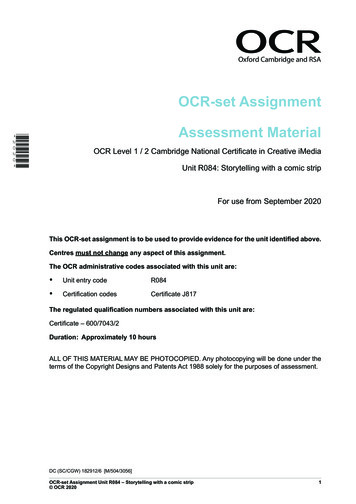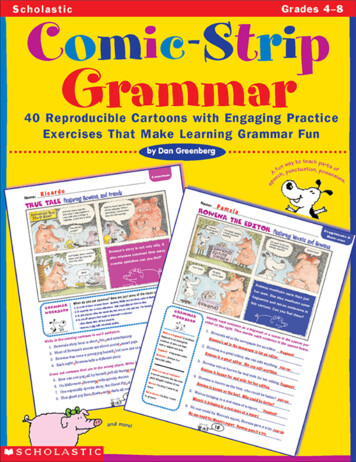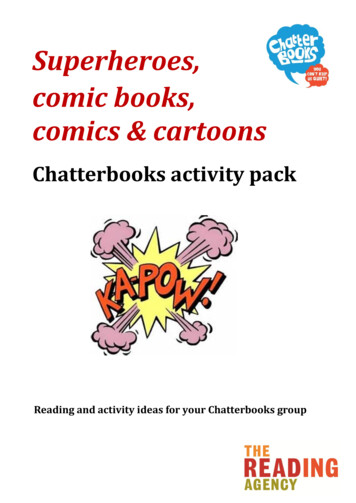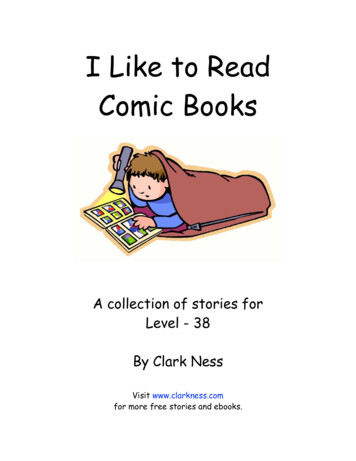
Transcription
The Comic, the Diva and the StumpHow to Handle Difficult and Apathetic PlayersPresented ByJohnn FourWith Awesome Contributions FromBertráM, Darren Blair, J. Criss, Jennifer Patz, JessWQ, JohnR, Jon Sadler,Kit, Matthew Ipock, Michael Horton, Monstrim, Nathan W. Meyer, Oliver Oviedo,Paul, Ruban Towr, Shelly Birger Phillips, The Bathyscaphist, Tyler ElkinkErrors, Omissions, Feedback?johnn@roleplayingtips.com
The Comic, the Diva and the StumpWhat's In This eBookIntroduction . 2Part One: The Request. “I'm having a terrible time and you don't know what you're doing.” . 3Part Two: 10 Tips to Resolving Group Conflicts . 4Part Three: In A Nutshell – Top Tips Summary Summary . 10Part Four: Here Be Solutions . 14More resources . 26IntroductionAfflicted with a problem player? Have a person at your table disrupting play or foiling a great gaminggroup? This ebook is for you! Game masters from around the world share with you their experiencesand advice from hard-won lessons learned at the table dealing with difficult players.In a recent Roleplaying Tips, game master J.A. asked for help handling difficult players in his group. Lotsof great advice poured in, which you can find a bit further into this ebook.But first, let me outline what’s in this ebook and how it’s laid out for you.The Comic, the Diva and the Stump has four parts:Part One: The Request. I give you the tips request J.A. initially made so you have proper context for allthe advice you’ll find in this book.Part Two: 10 Tips to Resolving Group Conflicts. A professional relationship counselor shares herexcellent advice on how to handle problem players and difficult group dynamics.Part Three: In A Nutshell – Top Tips Summary. So many great tips poured in, and you’ve got them all inyour hands. But I thought you might want a quick summary of the big points and best advice in case youneed help now and don’t have time to read the whole ebook.Part Four: Here Be Solutions. All the responses I received, edited where needed for clarity. Read theseto get lots of great ideas and approaches for handling those tricky players that always seem to pop up inour games.roleplayingtips.com/gm-booksHave more fun at every game!2
The Comic, the Diva and the StumpPart One: The Request. “I'm having a terrible time andyou don't know what you're doing.”From J.A.Hello Johnn,I recently began running a d20 modern game for a couple of friends. It's set in the thirties and has quitea bit of work put into it. The problem is my players seem apathetic towards the whole thing.They find side quests tedious, and they won't even bother with combat. When I ask if there's anything Ican do to make it more enjoyable, they tell me I'm doing great.In the party, I have two divas fighting for the spotlight and the third player sits off to the side with ablank stare on his face.Player ADoesn't take the game seriously. He's playing a female debutant with an addiction to opium. Thiswouldn't be a problem if he tried to be serious at least some of the time.Player BA diva. She demands the spotlight and is a constant one-upper. Her body language at the table screams,"I'm having a terrible time and you don't know what you're doing."Player CThe definition of a stump. He stares into space until I ask him to make a check or ask him what hischaracter is doing (which is usually following Player B's character).I've tried spicing things up with interesting NPCs, neat items and other little tricks, but I just can't getthem to bite. And when I ask for feedback they tell me they're really enjoying it. Am I missingsomething?Any suggestions?roleplayingtips.com/gm-booksHave more fun at every game!3
The Comic, the Diva and the StumpPart Two: 10 Tips to Resolving Group ConflictsBy Shelly Birger PhillipsRoleplaying games are amongst the most fun, rewarding andinteresting experiences you can have. But, as in any group,the personal relationships and group dynamics affectwhether you have a great time or a boring or upsettingexperience.Sometimes the other players at the table can be a realbummer. If you’re struggling to deal with a challengingmember of your group who seems to be dragging the rest ofyou down, don’t worry, I’ve got your back.By day as a relationship coach I don my cape and help peoplesort through the same issues we sometimes face at the gametable. I’ve got a lot of experience with this. And when Johnnasked on Facebook for professional tips on group dynamicsand handling problem players, I wanted to help.So, here are my ten tips to step up your emotional game andturn your dilemma into a peak experience.1. Enjoy YourselfFirst things first, if you’re not having any fun, then nobody else will be either.Consider the possibility your own unexpressed emotions might be showing up through other player’sbehaviors.For instance, if someone at the table seems irritated and annoyed, perhaps some part of you is alsoirritated and that emotion is being reflected back to you. On the flip side, if you’re having the time ofyour life, likely others will feel much the same way.So the lesson here is, the more fun you can have, regardless of the circumstances, the more funeveryone at the table will have.Wait a minute, did I just say “regardless of the circumstances”? Yes I did. Your ability to enjoy your life(and gaming) actually has nothing to do with the details of what you’re experiencing.If you’re using the circumstances of your life as an excuse to be miserable, then just cut it out right now(I know, easier said than done). But admit it already, you’re awesome, your life is awesome, and there’sreally nothing to complain about, now is there?roleplayingtips.com/gm-booksHave more fun at every game!4
The Comic, the Diva and the StumpHave you ever noticed that when you’re in a really good mood it can be almost impossible for someoneelse to ruin it for you? They might try that annoying pen clicking thing, or they start talking about howcrappy the weather is, but you don’t care, you feel great.Conversely, when we’re in a bad mood it doesn’t take much to send us off the deep end. The other day Ijust about ripped my husband’s head off when he told me the same old joke he tells every other day. Itseemed like if I heard that joke one more time I would explode!I know for certain that circumstances don’t really determine my emotional state, because the exactsame thing can happen when I’m in a good mood and it doesn’t bother me. But if I’m in a bad mood Iget upset.The trick here is to learn how to feel good and enjoy life no matter what’s going on.I used to hate doing dishes. Every single time there were dishes to do I used them as an excuse to getfrustrated.Then I read “Peace is Every Step” by Thich Nhat Hanh, and there was a passage in there about how wecan use dishes or red lights as a reason to be upset or as a reminder to enjoy the simple things in life.Thich Nhat Hanh described the joy of the warm soapy water and the satisfaction of seeing a stack ofnewly cleaned dishes. After reading his account, I’ve never seen doing dishes in quite the same way.Now I love giving my hands a bubble bath and methodically and intentionally cleaning my dishes.2. Maintain ComposureLiving in a state of composure is much more art than science and it requires a strong sense of self. But, ifyou find yourself shouting, name-calling, or doing other things that remind you of junior high school,you’re not exactly setting a good example for the other players at the table.If you want games to go smoothly, you have to set the tone and bring the other players back to centerwhen they go astray.Initially, that means learning to find your own “center” and remaining dispassionate about anyarguments or conflicts that might arise.Think of yourself as the wise guru, observing it all from your peaceful mountaintop retreat. But don’t letyourself disengage entirely. Your job as game master is to lead the group, and nobody can lead whenthey’re checked out.3. No More “You” Statements“You” statements are the quickest way to escalate an argument. If you want to amp things up, startflinging “you” statements around and watch everyone get uncomfortable fast.If your objective is to create harmony within the group so you can have more fun at every game, thenstick to “I” statements when tempers flare.roleplayingtips.com/gm-booksHave more fun at every game!5
The Comic, the Diva and the StumpBy sharing your own experience, you show you’re willing to be vulnerable and ask for what you wantwithout blaming or shaming the other members of your group.Sticking to “I” statements alone might not be enough to resolve the conflict, but it will help calm thingsdown and you won’t be adding fuel to the fire. Check out the difference between these two statements:“You’re such an attention hog! Can’t you let someone else talk for a change?”“I’m feeling frustrated and I really want to hear what the other players have to say about this.”Which one will escalate the argument? If you answered number one, you are correct! I think you willfind the second statement will have a neutral or positive effect.4. Get CuriousRemembering that everyone at the table is a unique and fascinating human being can completely shiftprevious feelings of frustration and irritation.Sure, he’s hogging all the attention, but what if you began to wonder why he seems to need to steal theshow. Is he uncomfortable with silence? Does he need an ego boost? Is this his only social outlet?Or maybe she’s quiet and hardly ever contributes ideas. Instead of getting irritated, try getting curious.What is going on in there? How can we create more space for her to share her ideas? What might sheneed to be willing to speak up?When we approach others with a genuine sense of curiosity, they naturally open up and sharethemselves more. No, you’re not doing group therapy, but discovering more about one another cansolidify your group and help everyone have a deeper, more meaningful connection.5. Set Clear IntentionsHave you ever been a part of a group that seems to have no leader and no clear intentions? In myexperience, most groups like that fall apart pretty easily because there’s no cohesive objective the groupagrees upon.Get clear about your intentions at the beginning of each session to boost morale, ensure success andidentify anyone who isn’t on board.As game master, it’s your job to set these intentions yourself or elicit them from your group.Why are you all gathered? What is your mission? What are your objectives? How will you know whenyou’ve had a successful game?Get clear about this for yourself first, and then either hand down your decree or ask the other playersfor their input.roleplayingtips.com/gm-booksHave more fun at every game!6
The Comic, the Diva and the Stump6. Become a Master of EmpathyNonviolent Communication (or NVC) by Marshall Rosenberg is the best resource I know to learn trueempathy. Empathy is a skill that will serve all your relationships, especially your relationship to yourself.When you understand what you and others are feeling and needing in a certain situation, you’re betterequipped to make decisions that will work for everyone.In NVC, empathy is distinct from consoling, sharing your previous experience or trying to get someone tostop feeling whatever they’re experiencing.Instead, NVC is based on the premise that all our feelings come from underlying universal humanneeds. These needs can be simple, like food, water and shelter, or more complex like the needs forconnection, contribution and self-expression.The idea is that by connecting with feelings and needs, it’s much easier to feel connected with the otherperson, thereby resolving or at least lessening any existing conflict.For instance, when I realize my toddler is screaming because she’s tired or hungry and not because she’strying to drive me insane, I have much more understanding and patience with her.7. Invite DissentThe more comfortable you are with your own emotional landscape, the easier it will be for you to inviteothers to share their upsets with you.This can be a tall order if you’ve avoided your emotions in the past, but I’m here to tell you it’sabsolutely possible to go from repressing your feelings to understanding and expressing them clearly.Inviting dissent is an advanced skill that requires a lot of clarity within yourself. But when you feelcompletely solid and clear about something, it can be a wonderful practice to ask others to share theirthoughts and opinions about your decision.Let’s say you’ve made a decision to penalize a player for some reason, but you can tell it’s bothering her.It might be worth taking a moment at the end of the session to allow her to air her dirty laundry andreally tell you how she feels about your decision.If you’re able to maintain composure and stay centered and clear about your decision, but you can alsoempathize with her frustration, you’ll gain her trust and she’s more likely to be willing to stick aroundand continue to play full out.8. Hone Your Mediation SkillsSometimes conflicts happen between players at the table and you’re not even involved, but as GM, youreally ought to be. You don’t want to stir the pot, but if you can mediate between players, you might beable to resolve the conflict and achieve more authority within your group at the same time.roleplayingtips.com/gm-booksHave more fun at every game!7
The Comic, the Diva and the StumpAgain, NVC is the best mediation technique I know and it’s helpful in all your relationships. But even ifyou don’t want to learn NVC, there are plenty of mediation skills you can learn from a quick onlinesearch.If you’re experiencing conflict within your group on a regular basis, take it upon yourself to learn tomediate skillfully. You’ll save time, create more harmony and build trust with your players. This is worththe effort, especially if you’ve been wary of conflict in the past.Just one more note on this one. If you’re thinking, “There is no way I will ever be good at mediation,”then it’s even more crucial you push through your fear or revulsion and learn mediation skills. They willserve you and everyone in your life.I was terrified of conflict for years, but now after learning and practicing NVC I actually get excited aboutthe possibility of mediating between two people who are involved in an argument. I get to help themresolve their issue, I don’t have to listen to them fight endlessly anymore and I’m much better atresolving my own conflicts too!9. Celebrate Wins TogetherThere’s nothing worse than putting too much focus on the boring or painful parts of life and forgettingto celebrate the fun and wonderful parts. If you feel your group sliding into a deep dark hole ofemotional processing or incredibly boring story lines, it’s time for an infusion of positive energy.I recommend you end each session with a review of the highlights of play. By celebrating the highlights,you put everyone’s attention on what they enjoyed and want more of in future meetings.This gives you great information about what the group enjoys and it also puts everyone in a positiveframe of mind as they’re preparing to leave, which makes increases the likelihood of them coming backfor more!Forgetting to focus on what’s working is one of the most prevalent mistakes I see in group dynamics. It’seasy to get wrapped up in the conflicts or the missteps and forget all about that awesome new twist orinteresting new side plot that everyone loved. Don’t make this mistake again!10. Ask for HelpIf you find yourself at a complete loss about how to proceed, ask your players for help figuring out nextsteps.Your friends are also complex and intelligent human beings, and they might come up with thoughts andideas you did not consider.As GM, it’s easy to get caught up in the idea you’re the only one in charge of the group. Truth is,everyone involved is responsible for maintaining the working relationships within the group.roleplayingtips.com/gm-booksHave more fun at every game!8
The Comic, the Diva and the StumpIt doesn’t have to be all up to you to decide what’s next or how to proceed. Ask for ideas, a show ofhands, a secret ballot, or whatever else you need to do to ensure participation and engagement withyour players.* * *So there you have it! My ten tips for dealing with problem players. I hope it was helpful and I would loveyour feedback and thoughts! So please hit reply and let Johnn know what you think.And have a fantastic day! Warmly, Shelly.Shelly Birger Phillips loves her amazing life. She is a life, relationship and dating coach who is passionateabout supporting you to have the most inspiring, joyful, and fulfilling life possible.When she’s not coaching, she’s enjoying her daughter, loving up her husband, wrangling her two dogs,two cats and four chickens, blogging about parenting, or watching a sci fi movie.You can find her on Twitter here or email her any time at oksHave more fun at every game!9
The Comic, the Diva and the StumpPart Three: In A Nutshell – Top Tips SummaryI’ve picked a few points out of the excellent advice sent in by Roleplaying Tips GMs and compiled theminto a top tips list. Handling player and group dynamic issues is always tricky, so please modify all adviceto best suit your circumstances.1. Shake Things Up For the CharactersYou’ve got players who are bored, spotlight hogs or comedians. Try switching things up in-game as yourfirst approach at modifying disruptive behavior.Create Your Own Testing LabLet’s do a Plus/Delta assessment from a character point of view.Take a sheet of paper and make three columns with these labels: Character namePlus Fill out character names, one per row.In the Plus column for each PC, list what’s working well for that character. There must be something thatis going ok, such as “interacts with NPCs,” or “Does well in combat,” or “Missing nephew sideplot isgoing ok.”In the Delta ( ) column, list ideas for changes that’ll solve whatever problems the character has in thegame. For example, “No spotlight sideplot – add one” or “Create a background tie-in with PC #2” or“Run a limerick contest.”Here is a Google image search to show you examples of Plus/Delta layouts.You want to keep the Plus items going in the campaign so you keep building on success.During sessions, you want to try to incorporate at least one Delta idea, and keep adding more ideasbetween sessions.When a Delta idea works, move it into the Plus column so you keep on doing that. When it doesn’t,scratch it off or try a new angle on it.Over time, through analysis, trial and error, you should build up a healthy Plus column to keepcharacters engaged in the game.DilemmasGive PCs difficult choices. This helps create engagement fast because the emotionally charged situationwith no easy answer draws players in.roleplayingtips.com/gm-booksHave more fun at every game!10
The Comic, the Diva and the StumpFor example, Kit describes a tricky situation in the Readers Tips section below where one player can onlysave one of the other two PCs, and must make a decision. I’d advise avoiding player vs. player situationsin dysfunctional groups, but sometimes you have to work with whatever strings you’ve got. And, as Kitsuggests, you can turn the situation into a hoax or twist so no PCs are actually harmed.Character DevelopmentTake time to build out a PC’s background and connections in the world. Connect PCs to each other.Threaten connections but don’t kill them, as Tyler Elkink suggests. In this way, you create engagemrntand can also balance out spotlight time with fairness and consistency.Use House Rules like Burning Wheel Style BeliefsOliver Oviedo suggests, “I will refer you to Luke Crane's book, The Burning Wheel.for a solution Iincluded in my own Pathfinder game to bring clarity and focus to player motivation and role play. Iintroduced the idea of Beliefs into my game.”Beliefs are a character development method. And you should feel free to mine other games you’veplayed that have mechanics to solve or encourage certain player behaviours.Solo Quests and Spotlight TimeReaders also suggested managing your PC sideplots to give quiet players more action and domineeringplayers balanced spotlight time.2. Shake Things Up Out Of CharacterIf in-character carrots don’t work, try working the game at the GM-to-Player level.Do Another Plus/DeltaGrab another sheet of paper and turn your game into a testing laboratory to quest for the Fabled RecipeFor Fun with your particular players.Column 1: Player’s NameColumn 2: Plus – List player interests and traits that add to the game and group dynamicColumn 3: – The Delta ideas of things you can try changing at the player levelAfter each session revisit your chart and update. Keep what’s working, change what’s not.If your players are up for it, show them the chart. Get their feeling s on your assessment.Oh, and be sure to include yourself in a row!Add What Players WantHook player skills and interests into your game.roleplayingtips.com/gm-booksHave more fun at every game!11
The Comic, the Diva and the StumpConfirm Game and SettingIs your ladder even up against the right wall? Check with your group that the game system and worldwork to their interests. If the group loves cyberpunk and is meh for epic fantasy, try switching for threesessions and see what happens.Are They Playing Appropriate PCs?Does the character suit the player’s personality? Does the plot?Maybe the comedian should play a bard so he’s got a venue in which to channel his wisecracks.Player Relationships?How do the players regard each other? JohnR brings up a good point about the possibility of playershaving entanglements outside of the game space that might be poisoning things at the table.Get to know your players personally so you can empathize better and try to help them out.Bring In New PlayersGet fresh blood at the table, as JohnR suggests. Even if it’s for a session or two playing NPCs or guestGMing. Change the dynamic and see what happens.3. Self-AssessmentAs GM, what makes you happy?“I suggest [the GM] think critically about what he wants to get out of the game, and how he can workwith what [the Players] give him.” – The BathyscaphistJohnR has similar thoughts by calling out the fourth player in J.A.’s game: J.A. himself.GMs generally make sessions happen. They organize, build and referee. Therefore, if they lackinspiration or energy, it’ll show during games.But more than that, the GM sets the tone and expectations of players, even if he does not realize he’sdoing it.For example, how can I expect players to stay serious and in-character if I’m always talking out ofcharacter or making wisecracks? Do I show favoritism? Do I respect the players, even ones with differentmentalities and behaviours?Seek to understand yourself first. From that foundation, work to understand your players and the groupas a whole. Emulate the behavior you want from others but embrace the differences others offer. Besure your game needs are taken care of so your enthusiasm and joy rub off.4. Rotate the GM ScreenA couple of GMs suggested you share GM duties. Ask each player to run a one-off session or adventure.Help the players understand your point of view by placing them in your seat.roleplayingtips.com/gm-booksHave more fun at every game!12
The Comic, the Diva and the StumpA spotlight hog might just be a natural GM. A comedian might see how his jokes kill the mood. Thestump might get jarred from lethargy or see the levers he has at his disposal as a player.5. Have a Group DiscussionNothing beats open and honest communication. In the short term it might be awkward or revealwounds. That’s why we avoid it. But long-term, it might not only save your group, but you might get thatmagic gaming experience you crave so much.Get a group discussion going. Act as facilitator, which means laying down the rules of healthy discussionand enforcing them. Intervene when players call each other names or criticize each other punitively.Encourage creation, not destruction. Be open to their feedback and wants.Then try things their way. See if behavior changes. Then work in more of what drives you as GM whilekeeping what’s working for the players.* * *Those are some high level points derived from the tips in the next section.The elephant in the room is always the option to fold the group and find new players. But that might notbe possible or desired.The ultimate responsibility comes from the mirror. You can only change what you control. And youcontrol just yourself, no one else. Make yourself better at reading people and empathizing with them,improve your emotional intelligence, learn how to communicate well.roleplayingtips.com/gm-booksHave more fun at every game!13
The Comic, the Diva and the StumpPart Four: Here Be SolutionsHere are all the responses I received to J.A.’s plea. Lots of great ideas and advice in here. Thanks to allthe Roleplaying Tips GMs who responded!Give Them a DilemmaFrom KitWell, sounds like it's time to shake things up in a big way. You'll find out soon enough if your players canbe "saved."Give Player A a tip about a new opium den with live music from a band that's all the rage and could bethe next big thing. Chances are even if the player can resist, the character's addiction won't let her. Shejust has time to make it to the club, but not to let her friends know.Give Player B a tip about that same band, the one everyone who is anyone wants to see, playing asurprise set at a little club near where she lives. If she sneaks out now, it's her chance to see the "it"band before the other character so she can one-up her earlier.Give Player C the following note from your new antagonist, brought to him as he has dinner."I've placed some delightful bombs in a couple of nice gin-joints at opposite ends of town. Youhave mere minutes to decide which one of your friends to save, and which one to mourn. Don'ttake too long deciding."Signed,XThe whole thing can be a hoax, or real, depending on your preferences. Should start up some livelyconversation seeing which character Player C is going to let blow up, and if he doesn't take action prettymuch right away, maybe it's both of them! If things go well, all 3 will be severely shaken up and you canhave both clubs detonate when the respective characters are a block away. Or if they don't play ball,blow up one or both divas. Maybe they'll just be injured, and really mad at the "stump" for not gettingto one of them.Be Serious, Consistent and InspiringFrom JessWQPlayer A – Make It SeriousFor the one who jokes around, come up with a situation where he has to consider serious consequencesfor his characters' actions.You could also pull in a shady past rival, ex-fiancé, or other NPC who would pull in some kind of seriousstoryline that both player and character have to take seriously.roleplayingtips.com/gm-booksHave more fun at every game!14
The Comic, the Diva and the StumpIn my game, when someone makes more of a "caricature" as opposed to a deeper character, I put themin a serious situation with real consequences. The key is to follow through with those consequences, inhopes they can turn the situation around and find empathy with their character and take him moreseriously.Sometimes I have had to take some drastic measures to not only get their attention, but to also starttaking their characters seriously, such as: Near death experience with cocaineA near-rape situationSomeone getting shot for joking with the wrong personI know those are harsh, but usually my players get the point after such story twists.Player B – Be Consistent to Set a StandardDivas are hard to work with. If you give them the attention they want, they tend to railroad the group,and when you don't, they'll bitch and complain (speaking from experience).Be yielding, but not too yielding. I hate to say this, but it's like dealing with a spoiled child in some ways.Be consistent, don't give in to demands, and don't let her have too much rope. Treat her like you wouldany gamer. This puts the ball in her court to decide if she wants to really be a part of this group or not.Player C – Offer Inspiring OpportunitiesFor the “stump”, you might consider creating a separate and intriguing storyline. Maybe separate himfrom the rest of the group, put him in a dangerous situation, or put the others in danger and makePlayer C hero of the day.This gives him time and opportunity to engage himself in the game by thinking of creative strategies forsaving himself or others in the group.You could try bringing in some of his past, too. Maybe he just needs a little encouragement andtemporary special attention to get him back into the game.Serve to Player Strengths & InterestsFrom Michael HortonFirst, who chose the setting and style of play? Have you surveyed your group to see what kind of setting,tone, and style of game they want to play?There have been lots of Roleplaying Tips at various times on how to deal with and cater to the differentplayers and play styles. Look at back-issues of RPT and pick a few to read.From my experience (please take with a grain of salt, as with all advice of this type) and this is a lot ofguesswork based on your descriptions:roleplayingtips.com/gm-booksHave more fun at every game!15
The Comic, the Diva and the StumpPlayer AIt sounds like he doesn't really want a game with a serious tone. He
of great advice poured in, which you can find a bit further into this ebook. But first, let me outline what's in this ebook and how it's laid out for you. The Comic, the Diva and the Stump has four parts: Part One: The Request. I give you the tips request J.A. initially made so you have proper context for all the advice you'll find in .










